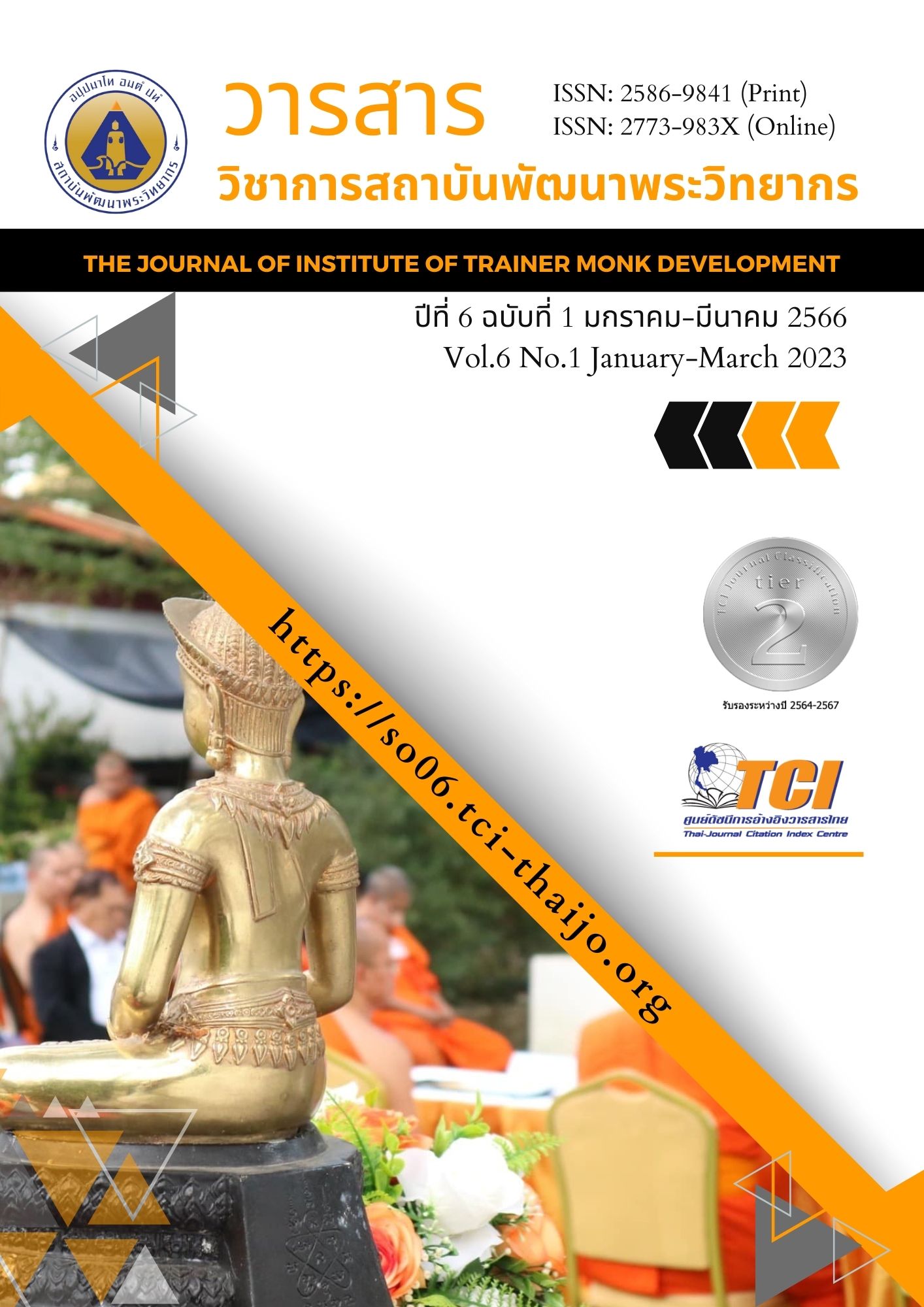Applying of Buddhist Principles to Improve People’s Quality of Life in the Area of Tha Sai Community Samut Sakhon Province
Main Article Content
Abstract
The research has the following objectives: to present guidelines for improving the quality of life by applying the Buddhist principles of people in the Tha Sai community area. Samut Sakhon Province conducting documentary research and field research. The results show that 1) Quality of life of people in Tha Sai community area Samut Sakhon Province found that people can live together in society appropriately. does not cause problems for society There are perfection in all four aspects, namely emotional, social, mental and physical, living in society by righteousness. have completeness in life especially in terms of physical and mental including the environment well-being and including a good society as well It is used in the field of self-development and society, making the family happy and being a strong community. 2) Buddhist principles concerning the development of quality of life that are beneficial to the quality of life of the people of Tha Sai community Samut Sakhon Province found that the Buddhist principles concerning the improvement of quality of life are very necessary in the present era. By the principle of Buddhism in Buddhism teaches us to be good people. Having precepts as the basis of life If there is complete precepts, it will make people in society live together happily, such as the 5 precepts, the 8 precepts, the Brahmawihan Dharma. The principle of aparhaniyadhamma, the eightfold path, secular dharma, itdibat dharma, and brahmawihan dharma, etc. and 3) Encouraging people in Tha Sai community to apply the principles of Buddhism for the benefit of a society that is dynamically changing every day. Modern people are increasingly turning their backs to Buddhism. To allow people in the general area to have broad access to Buddhist principles It is necessary to seek cooperation with local authorities, such as the Sub-District Administrative Organization (SAO) to arrange the voices along the lines. Dharma teaching tapes were opened. as well as preaching or discussing dharma problems Answer questions from relatives who have sent questions. Encourage the use of Dharma principles for real benefits, such as the Four Noble Truths in order to know the middle way. Not too obsessed with one thing. will set himself up in moderation However, they must not abandon the traditional customs of the community. Use customs and cultures to promote respectful learning and living. unity There is mutual assistance in the community.
Article Details

This work is licensed under a Creative Commons Attribution-NonCommercial-NoDerivatives 4.0 International License.
บทความที่ได้รับการตีพิมพ์เป็นลิขสิทธิ์ของวารสารวิชาการสถาบันพัฒนาพระวิทยากร
ข้อความที่ปรากฎอยู่ในบทความที่ได้รับการตีพิมพ์ในวารสาร ถือเป็นความรับผิดชอบของผู้เขียนบทความ และข้อคิดเห็นนั้นไม่ถือว่าเป็นทัศนะและความรับผิดชอบของกองบรรณาธิการวารสารวิชาการสถาบันพัฒนาพระวิทยากร
References
ขวัญตา พระธาตุ. (2564). พัฒนาคุณภาพชีวิตในการทำงานอย่างไร ? ให้ทันกับสถานการณ์ที่เปลี่ยนแปลงในอนาคต. สืบค้นข้อมูลเมื่อ 24 ตุลาคม 2564 จาก https://shorturl.asia/s1vO6
นันท์นัทธฉัตร ศรีวิเศษ. (2558). การประยุกต์ใช้หลักพุทธธรรมในการปฏิบัติงานของผู้บริหารและครูในสถานศึกษาขั้นพื้นฐาน สังกัดสำนักงานเขตพื้นที่การศึกษาประถมศึกษากาญจนบุรี เขต 2. การค้นคว้าอิสระ หลักสูตรครุศาสตรมหาบัณฑิต สาขาวิชาการบริหารการศึกษา. บัณฑิตวิทยาลัย: มหาวิทยาลัยราชภัฎกาญจนบุรี.
พระครูใบฎีกาชวรัสย์ อภินนฺโท (นุชประเสริฐ). 2560. บทบาทวัดในการพัฒนาคุณภาพชีวิตผู้สูงอายุในตำบลลาดใหญ่ อำเภอเมืองสมุทรสงคราม จังหวัดสมุทรสงคราม. สารนิพนธ์พุทธศาสตรมหาบัณฑิต สาขาวิชาการจัดการเชิงพุทธ บัณฑิตวิทยาลัย: มหาวิทยาลัยมหาจุฬาลงกรณราชวิทยาลัย.
พระมหาจรรยา สุทธิญาโณ. (2548). พุทธวิถี: พุทธประวัติ พุทธสิกขา พุทธจริยาวัตร พุทธภาวนา พุทธกิจ พุทธธรรม พุทธปัญญา. กรุงเทพฯ:ธรรมสภา
พระสุนันท์ กิตฺติสทฺโท (สายพิมพ์พงษ์). (2551). การประยุกต์ใช้อิทธิบาท 4 ในการทำงานศึกษากรณีผู้ทำเครื่องปั้นดินเผาด่านเกวียน จังหวัดนครราชสีมา. วิทยานิพนธ์ปริญญามหาบัณฑิต, มหาวิทยาลัยมหาจุฬาลงกรณราชวิทยาลัย).
มหาจุฬาลงกรณราชวิทยาลัย. (2539). พระไตรปิฎก ฉบับมหาจุฬาลงกรณราชวิทยาลัย. กรุงเทพมหานคร: โรงพิมพ์มหาจุฬาลงกรณราชวิทยาลัย.
สุภาคย์ อินทองคง. (2550). การใช้หลักพุทธธรรมนำการวิจัยและพัฒนาตามปรัชญาเศรษฐกิจพอเพียงสู่สุขภาพองค์รวม. บทความวิจัย. (ศูนย์เรียนรู้ชุมชนภาคใต้ (ศรช.)).


